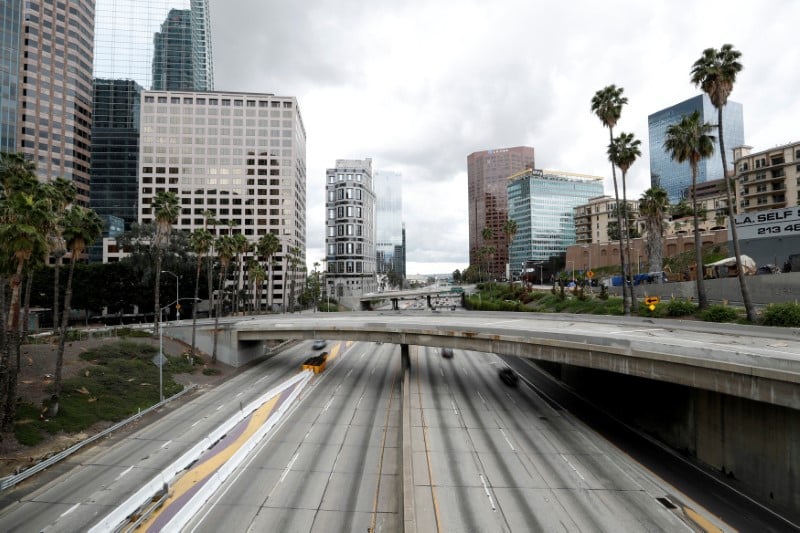Nearly 1 in 4 Americans were under orders to close up shop and stay at home on Saturday, as lawmakers in Washington neared a deal that could pump a record $1 trillion into the economy to limit the economic damage from the coronavirus.
New Jersey’s governor followed four other states – California, New York, Illinois and Connecticut – that have imposed unprecedented restrictions to slow the spread of infections, which have risen exponentially.
Governors in other states urged citizens to avoid large gatherings, even if restrictions were not in place.
“It’s like we are all lost in a movie that we can’t relate to in any way,” West Virginia Governor Jim Justice said, as he urged residents of his state to take the threat more seriously.
At least 23,941 cases of the novel coronavirus have been reported in the United States and 306 people have died from the COVID-19 disease as of Saturday evening, according to a Reuters tally of state and local government websites.
In Washington, Republican and Democratic leaders appeared to be nearing a deal to pump more than $1 trillion into the economy, adding to the hundreds of billions of dollars in fiscal and monetary stimulus that has already been deployed to prop up the world’s largest economy.
“I think we’re clearly going to get there,” said Senate Republican Leader Mitch McConnell, who scheduled a vote for Monday.
Hard-hit airlines are pressing for $29 billion in cash, promising in return not to furlough employees before September. But lawmakers said they were inclined to offer loans instead.
Two members of the U.S. House of Representatives have tested positive, and U.S. Vice President Mike Pence and his wife tested negative after an unidentified aide was diagnosed with the virus. Pence staffers said the aide had mild symptoms and had not had close contact with Pence or President Donald Trump.
Trump tested negative for the virus last week, according to his doctor.
Graphic: Tracking the spread of the global coronavirus – https://graphics.reuters.com/CHINA-HEALTH-MAP/0100B59S39E/index.html
READINESS
As hospitals braced for an influx of patients, Dr. Anthony Fauci, the U.S. government’s top infectious disease expert, urged Americans to postpone non-essential surgeries to keep beds available.
The Trump administration has struggled to line up tests to diagnose the disease, masks to slow its transmission, and medical equipment to treat those who have contracted it.
The U.S. Food and Drug Administration approved a test that can deliver a result in 45 minutes, rather than days, according to Cepheid, its maker.
At the White House, officials said they were delivering more tests and equipment where they were needed, but declined to say whether they had met benchmarks they had laid out earlier in the week.
Graphic: The novel coronavirus in the United States – https://graphics.reuters.com/HEALTH-CORONAVIRUS-USA/0100B5K8423/index.html
State and local officials say they are scrambling for supplies.
“We’ve gotten no help from the federal government, or limited help,” Illinois Governor J.B. Pritzker said at a news briefing.
New York Governor Andrew Cuomo said the state had identified 6,000 ventilators to help sick patients keep breathing, but needed 30,000 more. He said the state is sending 1 million N95 respirator masks to New York City – short of the 3 million city officials are seeking.
“We are literally scouring the globe for medical supplies,” Cuomo said.
In New York City, where more than 6,000 cases have been diagnosed, about a dozen people waited for a test in the parking lot of the Brooklyn Hospital Center.
“That’s insane,” city council member Mark Levine said in a phone interview. “If they’re well enough to stand in a line, they should be home resting, they don’t need a test, and they need to get out of the way.”
Federal authorities briefly stopped flights arriving at New York City-area airports after a trainee at an air traffic control center tested positive.
Neighboring New Jersey became the latest state on Saturday to adopt a statewide directive requiring residents to remain indoors except for trips to grocery stores, pharmacies, gas stations and other “essential businesses.”
Stay-at-home orders now apply to 84 million people in states that account for a third of the nation’s economy. Other states encouraged residents to reduce activity but did not put restrictions in place. Missouri went in a different direction, allowing child-care providers to take on more children.
The state directives were for the most part issued without strict enforcement mechanisms to back them up.
Cuomo said New York would fine and close businesses that defy the order. Chicago Mayor Lori Lightfoot said police would “admonish” people to go home.
In Ridgefield, Connecticut, where six new cases were reported on Saturday, town official Rudy Marconi said he would dispatch the police to break up a teenagers’ basketball game.
“We have no other tools in our toolbox. We have to rely on the social distancing,” he said.
(Additional reporting by Gabriella Borter, Caroline Spiezio, Barbara Goldberg and Jonathan Allen in New York and Jan Wolfe, Chris Prentice and Steve Holland in Washington, and Kanisha Singh in Bengaluru; Writing by Andy Sullivan; Editing by Daniel Wallis and Sonya Hepinstall)

























 Continue with Google
Continue with Google